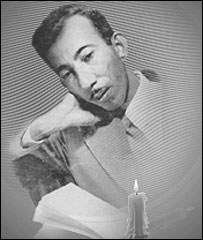Introduction to the Translation of the “Letters of Badr Shakir al-Sayyab”
Throughout the better part of his brief life (1926-1964) Badr Shakir al-Sayyab was haunted with the idea of death, the afterlife, mortality and immortality. At the end of his earthly journey, Badr made peace with himself, and thereby reconciled the two seemingly contradictory aspects of “Life” and “Death.” He conquered death by humanizing it, mastering his fear of it, and by surrendering to his fate as the ultimate rest for an ailing and constantly deteriorating body. Although never an existentialist, Sayyab, at one point, entertained the idea of embracing “Existentialism,” surmising that it might have the philosophical answer to his existential problem: how far and how high will he be able to carry the rock of Sisyphus? How long will his battle with destiny last and who will prevail? Sayyab was immensely in love with life, yet his poetry and personal letters ironically convey a different message and are colored with the dark clouds of dejection, frustration, loneliness, exile and poverty.
Sayyab played a prominent role in shaping the course of modern Arabic poetry and literature. The tragic journey of this poetic genius was marked with constant tragedies that punctuated his life with one disaster after another: the death of his grandmother, the tragic loss of his loving mother whose passing left a permanent scar on his soul, the stormy relationship with his father and insensitive stepmother, his intense political struggle against the Iraqi regime, persecution and repeated imprisonment and exile, job uncertainty and insecurity, extreme poverty, unhappy marriage and the burden of family obligations, and ultimately his ailing health and deteriorating physical condition that left him paralyzed from the waist down. All these catastrophic events that inflicted his frail body with severe and constant pain were unable to break his spirit, restrain his will or dampen his inspiration. He continued to write magnificent poetry that portrayed both his physical and psychological suffering. Even when he was on his death bed oscillating between moments of unconsciousness, hallucinations and lapses of memory, his imagination remained ablaze and alert, and his inspiration alive and focused. In the last few years before his tragic death, Sayyab renounced his political activities and turned from “committed” poetry to “personal” poetry that became more permeated with self eulogy and focused on his heroic struggle with destiny and man’s place in the universe.
These selected letters in English translation shed new light on the catastrophic life of this tragic hero and highlight important aspects of his otherwise, private moments and inner thoughts that he shared with a few elite friends that he had in Lebanon, Egypt, Syria, Iraq and England such as Adunis, Khalil Hawi, Youssef al-Khal, Suhail Idris, Albert Adeeb, and Ali al-Sabti. This is the story of Badr Shakir al-Sayyab in his own words without embellishment.
In translating these letters, I tried to be as faithful as possible to the original Arabic text and to the meaning that I believe the poet intended. These letters are organized in chronological order and provide us with a clear image of the development and maturity of Badr both as a human being and a poet. I sincerely hope that the translation of these selected letters into English will present new material useful for Sayyab’s students and scholars.
[From the book, al-Sayyab’s Letters, by Majid al-Samurra’i, (Beirut: Al-Mu’assasa al-‘Arabiya li-al-dirasat wa-al-Nashr, Second Edition, 1994, p. 62) Translated from the original Arabic and with an introduction by George Nicolas El-Hage, Ph.D., Columbia University.]

